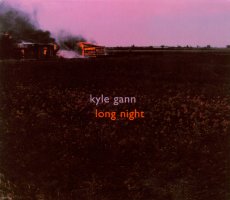
Temporal Constraints
Kyle Gann's
'Long Night' -
reviewed by
GORDON RUMSON'... music that makes us think.'
|

|
Kyle Gann is one of a rare breed. A long-time writer for New York's Village Voice he acted as wise counsel for New Music in America. He is also a scholar, with the definitive book on the great American composer Conlon Nancarrow. But his critical acumen and his scholarship are sourced in his compositional skill -- a good place to start.
Long Night for three pianos dates from 1980-81 but it is not dated. That could easily happen when cutting edge work is not combined with sure technique and genuine creativity.
The music takes a certain degree of its character from the minimalism of the time and especially the interest in non alignment of events. In this work
[listen -- 4:58-6:40],
three pianists (here actually only one, the redoubtable Sarah Cahill) operate in different tempo zones, playing patterns that are repeated at will, but co-ordinated by compositional choice in texture, dynamic and harmonic area. The only way I know this is because I obtained a score, otherwise I would not have been able to figure out all the details. It may sound minimal, but this belies a detailed background plan.
The sounding result is a shifting mass of meditative music, where easily identifiable gestures, operating within a kind of open modality, interact. A few moments after catching a phrase, we may hear it again, but in slightly different timing with another gesture, then again and different still. Thus we hear what is familiar, but hear it from a different perspective. A more traditional compositional practice would be to reharmonize a melody, but Gann has this sort of thing going on constantly.
Continue >>
Copyright © 20 October 2007
Gordon Rumson, Calgary, Canada

|

